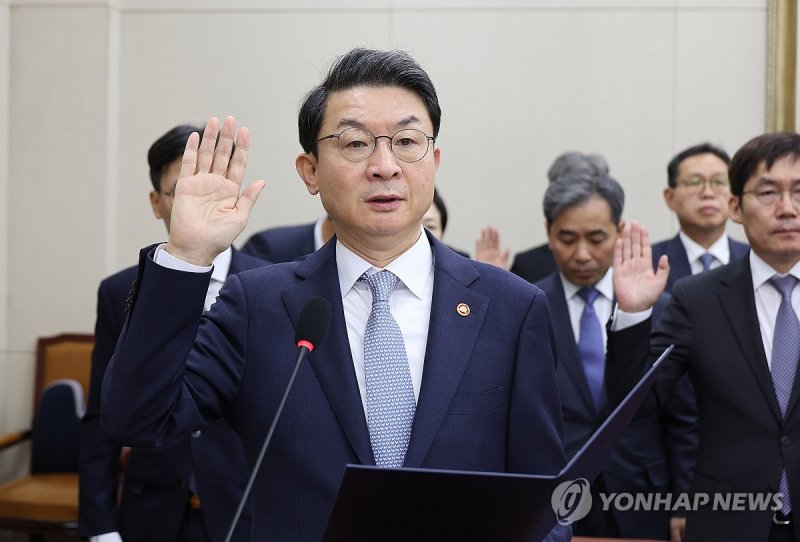South Korea's Financial Services Commission is transitioning from self-regulatory crypto exchange listings to direct government oversight while finalizing comprehensive stablecoin regulations.
South Korea's Financial Services Commission announced a fundamental shift from industry self-regulation to direct government oversight of crypto exchange token listings, marking the most significant regulatory transformation in the country's digital asset sector. The FSC is implementing mandatory listing regulations that establish transparency standards comparable to traditional equity markets.

Financial Services Commission Chairman Lee Eok-won takes the oath of office as a witness during a parliamentary audit of the Financial Services Commission and other agencies held at the National Assembly's Political Affairs Committee in Yeouido, Seoul, on the 20th. Photo = Yonhap News
The new framework addresses systemic deficiencies in current listing processes, particularly targeting "listing pumps" - dramatic price volatility that occurs following new token listings. The proposed regulations include codified listing and delisting criteria, trading suspension protocols, and comprehensive disclosure requirements. The framework mandates minimum circulation requirements before trading begins and imposes temporal restrictions on market orders following listings.
The legislation proposes renaming "virtual assets" to "digital assets," incorporating distributed ledger technology concepts to align with international nomenclature. The framework introduces granular categorization of market participants into distinct operational classes including exchanges, dealers, and custody service providers, while establishing foundational conduct prohibitions such as front-running restrictions.
The regulatory overhaul builds on South Korea's transformative 2024 developments in digital asset oversight. The Virtual Asset User Protection Act, enacted in 2023 and implemented in July 2024, established a dedicated regulatory regime for digital assets after years of regulatory uncertainty. The VAUPA introduced strict practices to prevent unfair trading practices and consists of two pillars: storage of virtual assets by users and regulation of unfair trading activities.
The 2024 regulatory tightening had immediate market impacts. By September 2024, eleven asset exchanges had shut down and three more temporarily suspended services, leaving 17.8 billion won in user funds affected. Major exchanges like Seoul-based Upbit and Bithumb faced stricter regulatory requirements, with Upbit encountering KYC and anti-money laundering compliance challenges.
Despite the regulatory pressure, South Korea's crypto market showed resilience with crypto lending services returning under stricter FSC guidelines, providing users with safer leverage trading options. The regulatory framework became a significant political issue, with crypto emerging as an election topic due to its impact on retail investors who comprise a substantial portion of the market.
Simultaneously, the FSC is finalizing a comprehensive stablecoin regulatory architecture featuring mandatory licensing for issuers and 100% reserve requirements in high-liquidity assets including deposits and government bonds. The framework guarantees user redemption rights and establishes regulatory protocols for foreign stablecoins such as Tether and Circle. The regulations will reportedly follow US regulatory approaches by including restrictions on stablecoin interest payments.
FSC Chairman Lee emphasized a cautious approach during this implementation phase, noting that interagency coordination is in final stages with an anticipated announcement within the year. The regulatory changes come as South Korea seeks to balance innovation with investor protection in one of Asia's most active crypto markets, where retail participation remains exceptionally high.
The regulatory push positions South Korea alongside other major economies implementing comprehensive crypto frameworks, as governments worldwide grapple with balancing innovation and consumer protection in the rapidly evolving digital asset landscape. The success of Seoul's approach could serve as a template for other Asian markets seeking to establish robust crypto oversight while maintaining their competitive edge in the global digital economy.
Connect with us:
Fast News: t.me/blockflownews
Insights & Trends: x.com/BlockFlow_News
 PEPE0.00 4.75%
PEPE0.00 4.75%
 TON1.51 -0.60%
TON1.51 -0.60%
 BNB883.56 1.46%
BNB883.56 1.46%
 SOL124.33 1.63%
SOL124.33 1.63%
 XRP1.90 1.11%
XRP1.90 1.11%
 DOGE0.12 0.78%
DOGE0.12 0.78%
 TRX0.30 -0.42%
TRX0.30 -0.42%
 ETH2936.82 2.48%
ETH2936.82 2.48%
 BTC88385.98 0.79%
BTC88385.98 0.79%
 SUI1.44 -0.26%
SUI1.44 -0.26%







